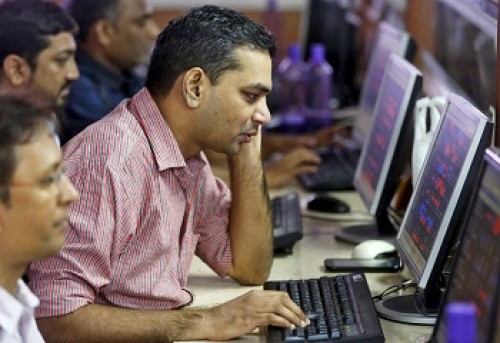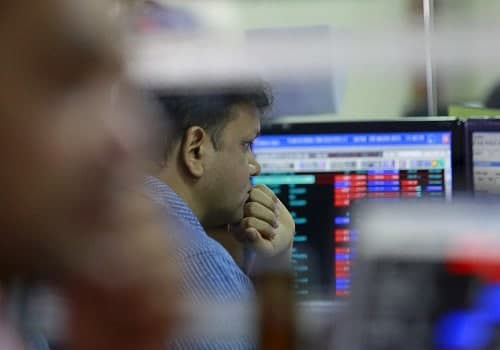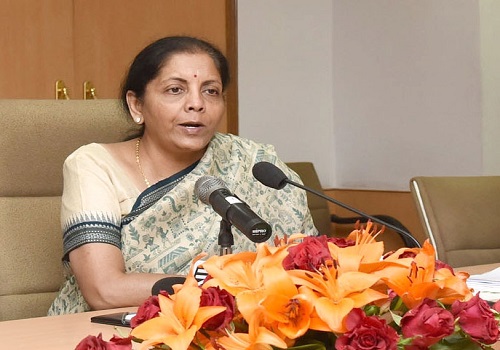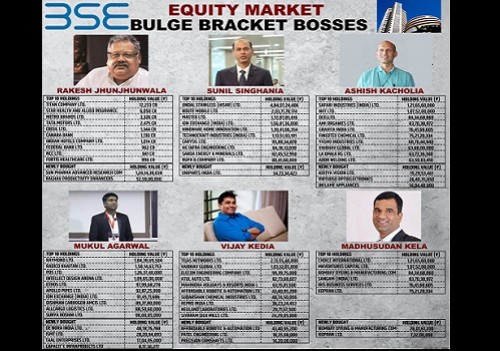Key indices close deep in red on Monday
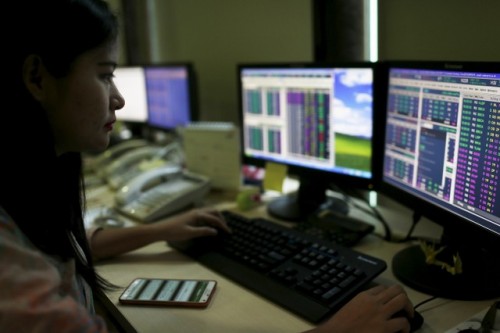
Follow us Now on Telegram ! Get daily 10 - 12 important updates on Business, Finance and Investment. Join our Telegram Channel
https://t.me/InvestmentGuruIndiacom
Download Telegram App before Joining the Channel
Indian equity benchmarks closed deep in red on Monday amid negative global cues. Markets have opened gap down, as traders got anxious with Niti Aayog CEO Amitabh Kant expressed concern over high food inflation due to higher prices of oilseeds and edible oils. Some cautiousness also came as India recorded 38,325 fresh Covid-19 cases in the last 24 hours, taking the total caseload to 31,143,595. The death count increased to 414,141 with 501 new fatalities. Traders were also worried amid reports that foreign portfolio investors (FPIs) have pulled out Rs 4,515 crore from the equities segment in the first half of July as they turn cautious towards the Indian market. But, key indices managed to reduce some losses at the end of the day, taking support from Services Export Promotion Council (SEPC) stating that the country's services exports are expected to grow 10 per cent in 2021-22 due to healthy growth of sectors such as professional and management consulting, audio visual, freight transport, and telecommunications. Some support also came with Finance Minister Nirmala Sitharaman’s statement that India's continuous wide-ranging reforms make the country an attractive destination for foreign investments. She also mentioned about stimulus packages announced recently; as well as strong, calibrated relief and reforms during COVID leading to sharp decline in new infections with ramping up of the vaccination programme. Meanwhile, RBI data showed that the country's foreign exchange reserves increased by $1.883 billion to touch a record high of $611.895 billion in the week ended July 9.
On the global front, Asian markets ended lower on Monday, while European markets were trading lower, as renewed virus fears, anxiety over stubborn inflation and concerns over the resilience of the economic recovery impacted investor sentiment across the region. Back home, on the sectoral front, Power stocks were in limelight as total outstanding dues owed by electricity distribution utilities or discoms to power producers fell 15.25 per cent to Rs 82,305 crore in May 2021 from a year ago. There was some reaction in oil & gas industry’s stocks as Commerce and Industry Minister Piyuh Goyal said India has set a target of 20 per cent ethanol-blending with petrol by 2023-24 and the ultimate goal is to have 100 per cent ethanol-run vehicles.
Finally, the BSE Sensex fell 586.66 points or 1.10% to 52,553.40, while the CNX Nifty was down by 171.00 points or 1.07% to 15,752.40.
The BSE Sensex touched high and low of 52,821.17 and 52,405.89, respectively and there were 4 stocks advancing against 26 stocks declining on the index.
The broader indices ended in red; the BSE Mid cap index fell 0.58%, while Small cap index was down by 0.31%.
The top gaining sectoral indices on the BSE were Realty up by 0.23%, Healthcare up by 0.17% and Utilities up by 0.05%, while Bankex down by 1.76%, Metal down by 1.43%, Auto down by 1.05%, Consumer Durables down by 0.84% and Telecom down by 0.80% were the top losing indices on BSE.
The top gainers on the Sensex were NTPC up by 1.89%, Nestle up by 0.59%, Dr. Reddy's Lab up by 0.27%, Sun Pharma up by 0.05% and Ultratech Cement up by 0.04%. On the flip side, HDFC Bank down by 3.34%, Indusind Bank down by 2.78%, HDFC down by 2.15%, Axis Bank down by 2.07% and Maruti Suzuki down by 1.89% were the top losers.
Meanwhile, Chief Economic Advisor (CEA) Krishnamurthy Subramanian has said that India’s economy will start witnessing a growth of 6.5 to 7 percent from fiscal 2023 onwards, helped by various reforms undertaken by the government so far and also as COVID-19 vaccination drive progresses. He said the second wave of COVID-19 is unlikely to have a very significant on the economy. The country's economy contracted by 7.3 per cent in fiscal 2020-21.
Subramanian said the momentum in recovery that was seen in the fourth quarter of FY21 and overall in the second half of FY21 got impacted to some extent by the second wave of COVID-19. While the second wave was quite devastating on the health side, he said the economic impact of that has been limited because the second way was much shorter in duration compared to the first wave and the economic restrictions that were placed were primarily at the state level.
CEA said the supply-side reforms undertaken by the government in sectors such as agriculture, labour, export PLI scheme, change in MSME definition, creation of the bad bank, privatisation of public sector banks among others, are going to push growth in the future. He said vaccination is important for the country to recover from the pandemic and to convert COVID-19 into effectively the common flu and reduce its impact significantly.
The CNX Nifty traded in a range of 15,836.90 and 15,707.50 and there were 11 stocks advancing against 39 stocks declining on the index.
The top gainers on Nifty were NTPC up by 2.02%, BPCL up by 1.56%, Divi's Lab up by 1.00%, Nestle up by 0.60% and Tata Consumer Products up by 0.42%. On the flip side, HDFC Bank down by 3.38%, Indusind Bank down by 2.81%, HDFC Life Insurance down by 2.74%, Axis Bank down by 2.22% and HDFC down by 2.14% were the top losers.
European markets were trading lower; UK’s FTSE 100 decreased 148.34 points or 2.12% to 6,859.75, France’s CAC decreased 135.39 points or 2.1% to 6,324.69 and Germany’s DAX decreased 320.18 points or 2.06% to 15,220.13.
Asian markets ended lower on Monday, with concerns over worsening corona-virus situation and inflationary pressure. Japanese shares ended lower due to worries over the spread of the highly contagious Delta variant ahead of the Tokyo 2020 Olympics, while anxiety ahead of June's inflation data also impacted sentiment. Meanwhile, Chinese shares ended with a flat note. Chinese central bank PBOC will meet this week to fix its one- and five-year loan prime rate (LPR), with the decision is due on Tuesday, with markets expecting status quo to continue.
Above views are of the author and not of the website kindly read disclaimer
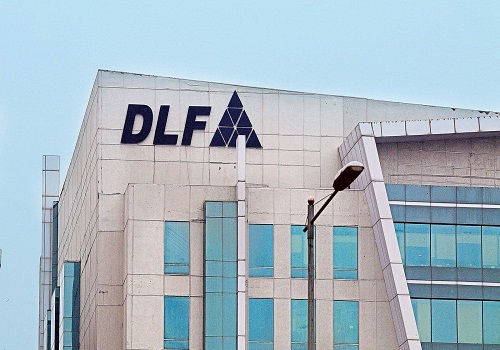


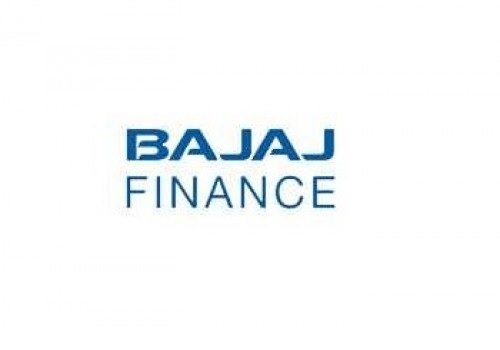




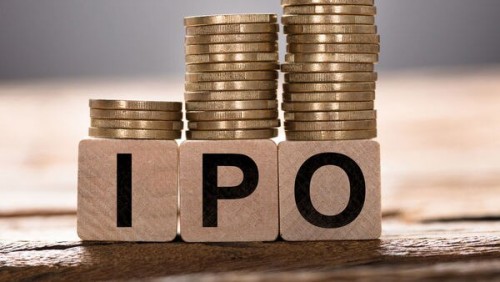

Tag News

Weekly Market Analysis : Markets strengthened recovery and gained nearly 2% in the passing w...



More News

The outcome of the meeting is in line with the twin objective of maintaining economic growth...
